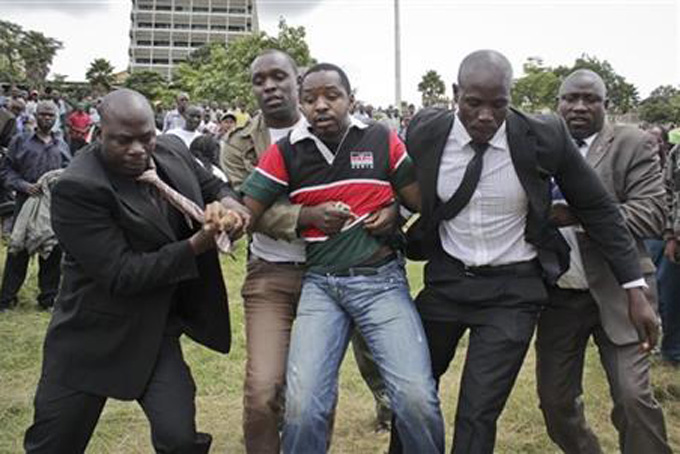
Kenyan social campaigner Boniface Mwangi, center, is arrested by security forces during a protest he organized at Uhuru Park in downtown Nairobi, Kenya. (AP Photo/Paul Munene)
by Tom Odula
NAIROBI, Kenya (AP) — Boniface Mwangi’s hands trembled as he typed a Twitter post about his intention to heckle Kenya’s top union leader at a rally attended by Kenya’s new president.
To an Associated Press reporter in the crowd with him, he said: “There is fire in my belly, but my feet are trembling.” He knew that for taking on such powerful forces at an event being broadcast live on national radio and TV, he might be beaten and end up in jail. “My feet can shake all they want, but all I need is my voice.”
Mwangi, a 29-year-old photojournalist and father of three, is also an increasingly visible social campaigner who says he wants to unleash a “Kenya Spring” for a country bedeviled by poverty, corruption and a culture of impunity.
“The masses are ignorant… They lost their voice and we want to help them discover that voice,” he says.
At the May Day rally, Mwangi and 20 friends planned to shout down Francis Atwoli, the secretary general of the Central Organization of Trade Unions, for supporting a hefty pay raise for members of parliament.
When Atwoli approached the podium, Mwangi stood up and repeatedly shouted “msaliti,” Swahili for “traitor.” But no one joined in and he quickly found he was alone as big men in black suits bore down on him and Atwoli told the crowd his “army” was taking care of the interruption.
The men in black chased Mwangi into a corner and beat him. Then his supporters arrived and formed a human shield around him. Police moved in and Mwangi emerged with a bloodied mouth. He was arrested, released, and faces a charge of “offensive behavior in a manner likely to breach peace.” It carries a penalty of up to six months in jail or a $65 fine.
But Mwangi’s lone protest wasn’t in vain. It went out live on TV and sparked discussion on social media of MPs’ salaries, the union leader’s position, and freedom of expression and assembly.
Kenyans are Africa’s second most active Tweeters after South Africans, according to a 2011 survey by Portland Communications, an international company. Tony Mbogo, whose company Timisha Solutions monitors social media, says the hashtag (hash)freebonifacemwangi was very popular on Kenyan social media between May 1 and May 3.
Mwangi, who has more than 33,000 Twitter followers, says: “Twitter is my own personal radio station where I broadcast my opinions.”
The May 1 event was not the first to pit Mwangi against Kenya’s political class. He made a name for himself photographing the violence that followed the 2008 presidential election, and became famous in Kenya and on the Internet for his role in organizing the painting of detailed and colorful anti-establishment graffiti on city walls. In 2009, police arrested and beat him for shouting at then President Mwai Kibaki at a public event.
His protests target a political class seen by many Kenyans as purveyors of corruption, impunity and tribalism that shortchange the poor and hold their country back.
Legislators’ salaries are a particularly sore point with Mwangi. In January, he organized the burning of 221 coffins outside Parliament when MPs — or the “MPigs,” as he calls them — attempted to award themselves a $110,000 bonus to close their five-year term.
The May Day protest referred to MPs’ demands to reverse the ruling of a government commission that shrank their salaries from around $126,000 to $78,500, and impeach its members. Before that ruling, the lawmakers determined their own pay.
The minimum wage in Nairobi is about $1,500 a year.
“How can you demand taxpayers buy you an $80,000 car so that you can drive it into the slum where your constituents have nothing to eat? Are these people normal?” Mwangi asks.
MPs argue that they need high salaries because they are expected to help their poor constituents pay school fees and hospital bills.
A World Bank report released in December said with the money Kenyan firms pay in bribes each year they could hire 250,000 people. Doctors in public hospitals last year went on strike to protest a health care system so deprived that clinics often lack basic medicines and surgical gloves.
But campaigners like Mwangi, are rare. Another, Mwalimu Mati, says Kenyans aren’t ready for drastic change. They “are so beaten down that they think if they behave, their leaders will throw them bread crumbs,” Mati said. One of the reasons the May Day rally draws crowds is that it’s where increases in the minimum wage are announced.
Uhuru Kenyatta, the new president, hasn’t said anything specific about the MPs’ pay claim since he was sworn in last month, but he complains that civil service salaries in general are eating up half of all revenues collected by the government.
“Sometimes it really hurts. Instead of asking how we are going to serve our people, we are asking ourselves how we are going to get more money in our pockets,” he said in a speech Thursday. “Please, let us do what is important first, which is serving Kenyans.”
